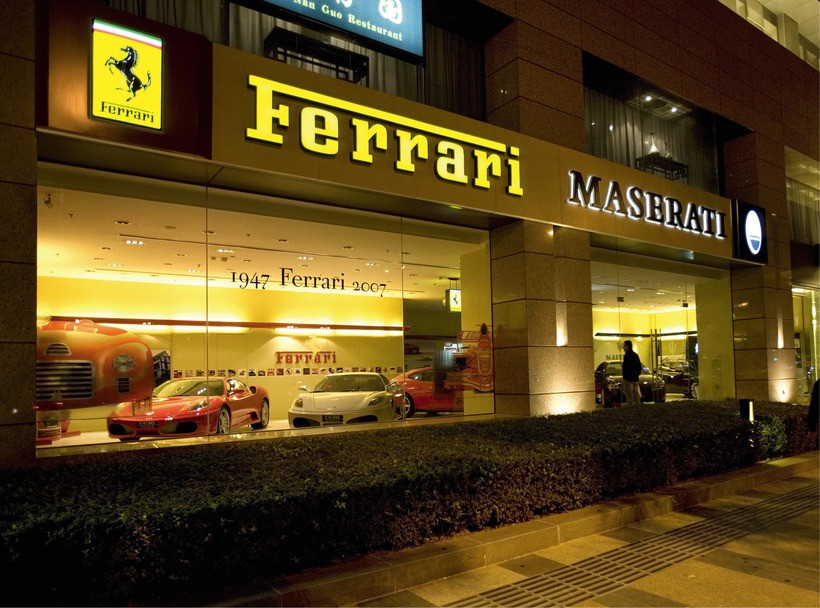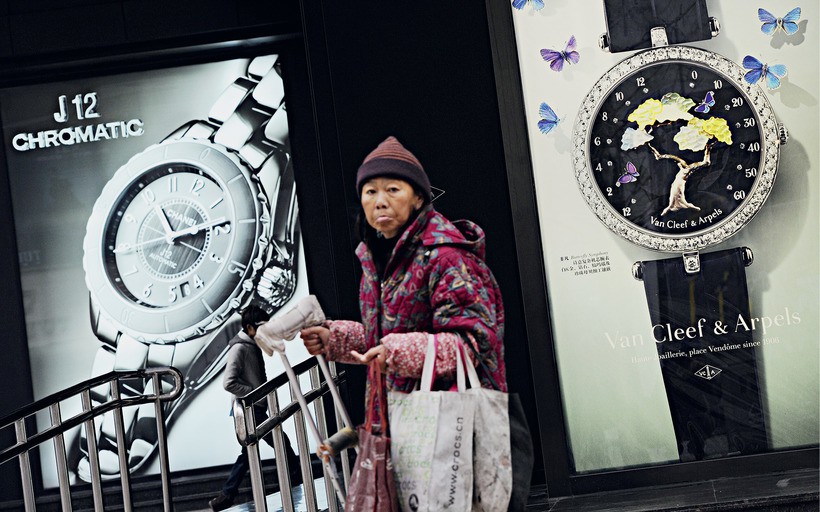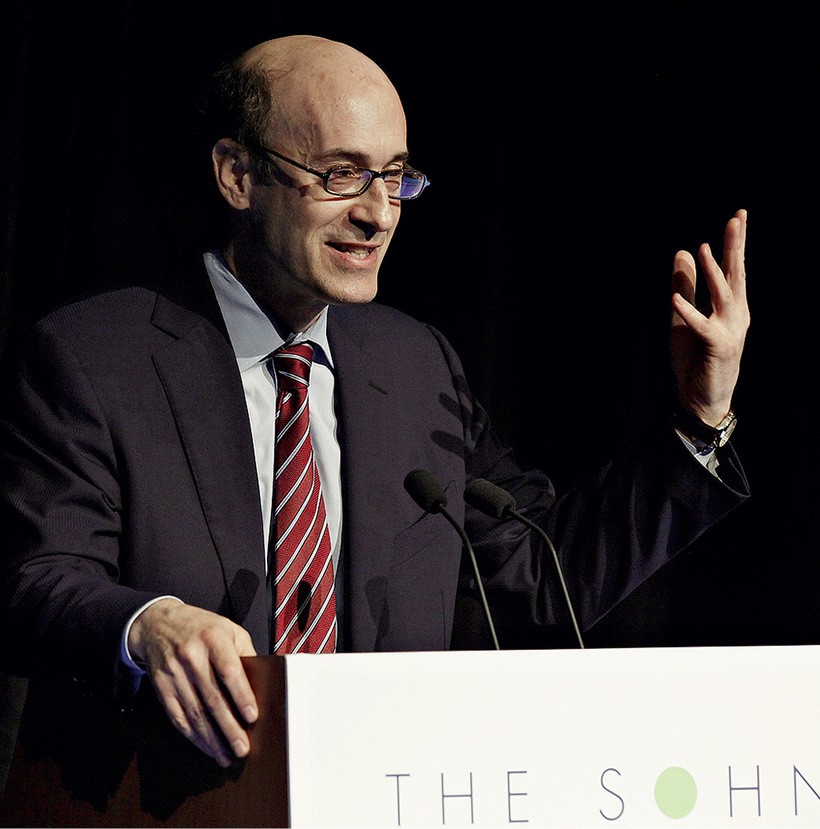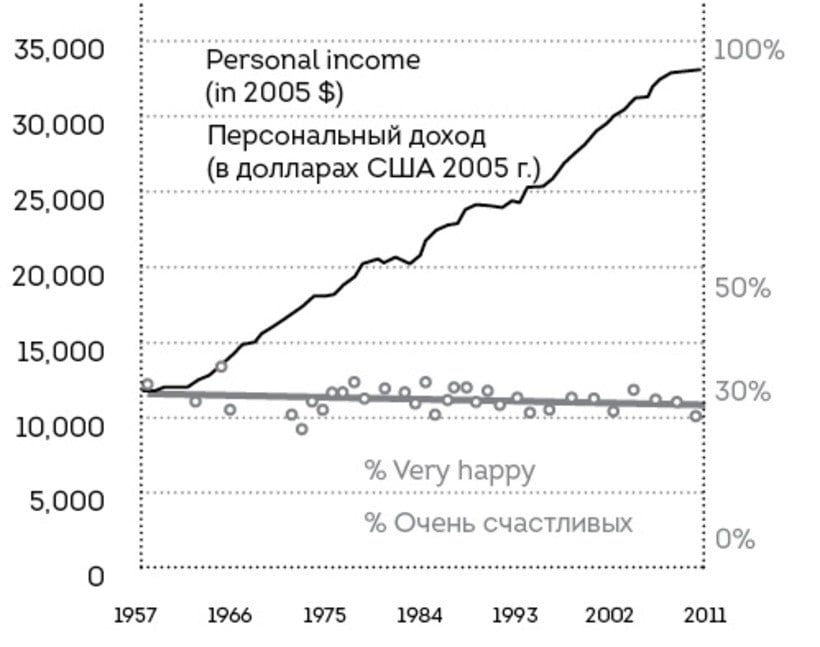Buying happiness
Shortly before he announced a third round of quantitative easing Ben Bernanke, as head of America’s Federal Reserve, suggested switching attention from macroeconomic figures to the level of happiness and satisfaction with life. Economists and psychologists agree that GDP growth is only a source of happiness for the very poorest among us. This suggests that the success of a country should actually be measured in a more nuanced, personal way.
Text by: Nikolai Kochelyagin, Yulia Belik
Bernanke’s suggestion should not be dismissed as an attempt to distract from US GDP growth rates, which he has so far proved unable to sufficiently stimulate. Americans have long been discussing the misuse of this index. Robert Kennedy, younger brother to US President John Kennedy, said that the gross domestic product “measures everything …except that which makes life worthwhile.”

Joyless growth
Economists are constantly raising the question of how to measure national development more objectively. This year, experts from the Organisation for Economic Cooperation and Development (OECD) developed a new index, which integrates 34 different parameters related to people’s quality of life, among which is the “sense of happiness”. The Economist magazine used these same parameters to rate 34 member countries of that organisation, also adding non-members Russia and Brazil for good measure.
The results? These two countries ended up among the five stragglers, while the old, developed powers headed the list. The rating was led by Australia, a country where people live the happiest lives, judging by the aggregate of criteria such as access to labour and wage volumes, environmental preservation, quality of healthcare and education, and a general sense of well-being.
“The lucky country” was unscathed by Europe’s economic crisis—the state has virtually 100% employment and is experiencing an economic boom triggered by the demand for fossil fuels, of which the country has vast reserves.
With a somewhat lower rating, the USA is a close second. However, in America the gulf between the poorest 20% and the richest 20% is colossal, which held the country back from pole position in the chart.
The third and fourth positions are held by Sweden and Norway, respectively, with an almost identical winning combination of factors, while the parameter of actual happiness is traditionally the highest in Norway.
Russia takes 33rd place in the OECD list, with factors like the availability of money, the number of jobs and the preservation of nature slightly trumping Brazil and Chile.
The new OECD rating in a number of ways echoes the UN’s Human Development Index, which measures the quality of life, literacy, education and lifespan. According to the survey, the lead positions are held by Norway, Australia, the Netherlands, the United States and New Zealand. This indicates that, with respect to the most important indices for regular citizens, the old, developed countries continue to lead the pack (and they are still “happier”), while the fast-growing economies can so far only boast mere GDP growth.
Justice, equality and happiness
Eswar Prasad, an economics professor from Cornell University, has further developed this topic, accusing the governments of the countries that lag behind of poor prioritisation. He considers that protests in developing countries have been prompted specifically by their governments concentrating on GDP growth, without caring enough about justice.
it cannot be ruled out that future heads of state will make reports on per capita happiness, while GDP growth rates will remain a secondary parameter, of interest only to economists
“Leaders in emerging markets are getting a clear message from the streets that growth is not everything. They want to tackle the problem of corruption,” notes Eswar Prasad.
“Emerging market economies delivered strong growth the last 10 years, but growth of corruption was faster. Open corruption and pervasive inequities create a toxic brew that is undermining support for reforms needed to sustain people’s well-being,” underscores the researcher. “Corruption restricts access to social services and other state benefits for people living in developing countries.”
The costs of large-scale corruption are shifted onto the population indirectly, and therefore people often do not notice them. Yet economic growth has boosted inequality—some have become extremely rich, while the majority has remained poor. Against this backdrop, thievery has become especially noticeable, emphasises Prasad. In such conditions, any deterioration of the economic situation—even insignificant dips in the growth rate—provokes mass protests.
Prasad is confident that there is only one way out of a situation like this. Politicians and civil servants concentrate too much on sustaining economic growth, and they would do well to fight corruption and develop institutions. This could facilitate the distribution of income in developing countries.
The famous economist, Professor Kenneth Rogoff of Harvard University, offers a similar opinion. He is confident that economic growth should no longer be the central goal of development, as this factor, alone, does not make people happy.

What happens to happiness as income goes up over the life cycle – does happiness go up too? The answer is no
“It is absurd to idealize maximum long-term growth in the average income term, while at the same time ignoring other factors and risks,” claims Rogoff. “Think about it: is it really so important for you, how many years it will take for your wealth to multiply: a hundred years, two hundred, or a thousand?”
Traditional statistics measuring national wealth are restricted, and do not take into consideration social aspects, such as life expectancy, education levels and much else, indicates the professor. He notes that a country can have a high GDP but a low human development index—a parameter that reflects living standards, literacy and life expectancy.
One of the main criteria of a good life is equality, according to Rogoff. In his opinion, one has to take into account the fact that people do not assess only their financial status, but also compare themselves to others. Based on this comparison, they decide how well they are living.
It is curious that Arkady Dvorkovich, aide to the Russian President, when broadcasting the Kremlin’s position, used his microblog to respond to Rogoff’s theses as follows: “You need growth—otherwise, there can be neither freedom nor equality”.

Meanwhile, the thesis of the importance of social equality is confirmed in the example of China. A group of economists, headed by Hilke Brockmann and Ian Delhey, studied the growth in satisfaction with life in China, between 1990 and 2000: rapid economic growth in the country was accompanied by a stratification of society, and the level of satisfaction with life fell over the ten-year period.
The researchers’ explanation was that the citizens themselves were disappointed by the success they achieved: the Chinese, after seeing their living standards rapidly escalate, quickly became accustomed to this, and started to perceive the new, elevated standards as the norm. Compared to their neighbours, they looked fairly successful. However, the incomes of the rich Chinese grew even faster, while economic growth was accompanied by growing income inequality.
The sense of control over one’s life fell, there was less free time, against a background of dissatisfaction with the political system which, according to the experts, also influenced the subjective perceptions of the Chinese. But the main reason for their “unhappiness” was growing inequality.
Two tiers of happiness
Swiss bankers, long accustomed to big money and its owners, consider that economic wealth should be assessed differently for each country.
ArKady Dvorkovich, aide to the president of Russia, has twitted on Harvard University professor Kenneth Rogoff’s theses on the priority of happiness in life of a country


“The discussion on the perfect indicator has already been pursued for a long time—for the moment without having come to a result,” notes the Swiss Bankers Association. “Those who are criticizing the GDP growth as an indicator haven’t provided an alternative so far. Perfect indicators vary over a time period and between the considered countries. When evaluating economic policy measures, there are always precise indicators that can be used to describe their effect.”
A number of experts propose that poor and rich countries be evaluated separately. After all, when the standard of living of citizens is low, equality and justice are far from people’s minds.
“For poor and developing countries, the GDP dynamic is an absolute, objective factor in assessing quality of life,” notes Dmitri Panchenko, the deputy general director of the investment company Freedom Finance. “So far, the basic needs are not being met, and the poorest groups still remain—those who still need clothing and food, and no opinion survey will accurately show their happiness level.”
In the rich economies of North America and Europe, meanwhile, the populations are tackling a very different set of problems. Citizens of the developing countries do not understand these problems, while for America they are very acute. “Wage growth even at the level of economic growth, of 2–3% annually, does not allow the average American to quickly move into a new house, buy a Ferrari, visit prestigious vacation resorts or go to expensive restaurants,” emphasises the financier.
In his opinion, the general level of happiness, measured after the basic problems of life are resolved (housing, food and clothing) is often not connected to the GDP or the economy: “American happiness, apparently, is taken as an example of happiness by everyone, except the Americans themselves.”
robert Kennedy, younger brother to US President John Kennedy, said that the gross domestic product “measures everything …except that which makes life worthwhile”
“Therefore, the GDP index objectively reflects social satisfaction only in poorer countries,” notes Panchenko. “For the biggest economies in the world, we most likely need to add a whole series of other sociological indicators: birth rate, life expectancy, etc.”
Richard Easterlin, professor of Economics at the University of Southern California, uses the example of his rich country to show that, even given a fairly high income level, money does not increase one’s happiness.
“To judge from survey responses, most people certainly think that money makes them happier. When asked how much money they would need to be completely happy, people typically name a figure greater than their current income by about 20 per cent. Indeed…those with more income are, on average, happier than those with less. But what happens to happiness as income goes up over the life cycle – does happiness go up too? The answer is no,” according to Easterlin.
The 86 year-old professor proves this with the example of Americans born in the 1940s. Between the years 1972 and 2000, as their average age increased from about 26 to 54 years, their average income per person—adjusted for the change in the price of goods and services—more than doubled, increasing by 116%. Yet, their reported happiness in the year 2000 was no different from that 28 years earlier.
Consider two subgroups of persons born in the 1940s. One group has at least some college education, and the other group only has high school education or less. Initially, the first group was happier. Obviously, the income of better-educated people grows faster. It would seem that their level of happiness should rise in the same way. However, in actual fact it remains constant in both groups.
That is to say, on the “second tier of happiness,” income growth and GDP are already virtually insignificant. In this connection, Easterlin joins his colleagues, who call for an adjustment of the method used to assess the prosperity of countries.
“GDP focuses on material goods. Happiness takes account of all aspects of people’s lives. The broader measure, happiness, is obviously more meaningful,” concludes the professor. Therefore it cannot be ruled out, that future heads of state will make reports on per capita happiness, while GDP growth rates will remain a secondary parameter, of interest only to economists and materialists.
THE PSYCHOLOGIST’S VIEW
Hope College Psychology Professor David G. Myers confirms from the State of Michigan that the economists are right: money only brings happiness when climbing the first rungs of the financial ladder. More generally, happiness depends on equality.
“Increased personal income (“disposable” inflation-adjusted income) in the USA has been associated with no increase in self-reported happiness,” notes Myers.
“In most countries, and especially in poor countries, individuals with lots of money are typically happier than those who struggle to afford life’s basic needs. They often enjoy better health than those stressed by poverty and lack of control over their lives. So, it seems that the kind of money that is enough to buy your way out of hunger and hopelessness also buys some happiness.
But once one has enough money for comfort and security, piling up more and more matters less and less. Ever more money does allow us to enjoy more things and feel more control over our lives, but it does less to increase our feelings of happiness,” explains the expert.
“That’s partly because of the diminishing returns phenomenon (familiar to economists as diminishing marginal utility). Experiencing luxury diminishes our savouring of life’s simpler pleasures. If you’ve skied the Alps, your neighbourhood sledding hill pales in comparison.
In other words the power of more money to increase happiness is significant at low incomes only. A $1,000 annual wage increase does a lot more for the average person in Malawi than for the average person in Switzerland. This implies that raising low incomes will do more to increase happiness than raising high incomes.
In Europe, Australia, Japan and in China living standards have risen but satisfaction has not. These findings lob a bombshell at modern materialism: economic growth in affluent countries has provided no apparent boost to morale or social well-being,” emphasizes he researcher.

“Ironically, in every culture, those who strive hardest for wealth have tended to live with lower well-being, especially when those hard-driving people were seeking money to prove themselves, gain power, or show off rather than support their families. Those who instead strive for personal growth…experience a higher quality of life,” writes Myers.
The expert also confirms the thesis put forward by Rogoff and other economists that equality is needed to achieve happiness: “Approximate equality with other citizens is more important for people than high income itself. Income inequality in a country is a predictor of lower average well-being for most citizens. It means more relatively poor people, who can compare with the much richer people and feel relative deprivation.
We are always comparing ourselves with others. And whether we feel good or bad depends on who those others are, ambiguously comments the professor.
THE ECONOMIST’S VIEW
GDP: no happiness handicap?
A respectable GDP level is a vital condition for happiness—but not a sufficient one, considers Ruslan Grinberg, Director of the Institute of Economics of the Russian Academy of Science and correspondent member of the Academy of Sciences. Therefore, the BRICS countries have become happier over the past years, but there is no guarantee that this trend will continue.
It has long been known that GDP growth is not an ideal indicator of happiness, but a more accurate measure still remains to be found, notes the economics expert. Probably, in order to adequately assess the dynamic of national development, the UN Human Development Index should be used. This enhances the per capita GDP with data on education, literacy and life expectancy. There is also the International Happiness Index (an index that reflects the prosperity of people and the state of the environment), which includes a lot of different indicators. Notably, that index is led by countries that are far from being the world’s richest.

 So one could say that a high GDP is a necessary but minimum
pre-condition for happiness, emphasises Grinberg. We need to have full
stomachs, clothes on our backs, and so forth, and then we run into other
problems: freedom and justice. There is a country in Asia called
Bhutan. There, the GDP is below average, while the happiness index is
higher than in European countries that have a per capita GDP in the top
five. Incidentally, Bhutan is the only country in the world that
officially uses a “Gross National Happiness” index instead of the “Gross
National Product”; this indicator of the quality of life includes moral
and psychological values.
So one could say that a high GDP is a necessary but minimum
pre-condition for happiness, emphasises Grinberg. We need to have full
stomachs, clothes on our backs, and so forth, and then we run into other
problems: freedom and justice. There is a country in Asia called
Bhutan. There, the GDP is below average, while the happiness index is
higher than in European countries that have a per capita GDP in the top
five. Incidentally, Bhutan is the only country in the world that
officially uses a “Gross National Happiness” index instead of the “Gross
National Product”; this indicator of the quality of life includes moral
and psychological values.
Therefore, notes our expert, there is no connection between GDP and happiness. The same is true for money: it does not get in the way of being happy, on the other hand money is not the equivalent of happiness.
Nevertheless, in BRICS countries over the past twenty years, there has been a notable increase in the “satisfaction” of citizens with their lives. As a result of GDP growth, a middle class was formed. However, there is no guarantee that this will continue.
In actual fact, the middle class should make up 60–70% of the entire population of a country. However, this will not mean that the country’s happiness is in hand. The paradox is that the countries most struck with despondency are those where the middle class is well established. At the same time, it has been growing thinner in recent years, and perhaps this triggers depression.
In developing countries, the middle classes have swelled in recent times from 7–10% to 15–20%; this is a big jump, and grounds for joyful celebration. Nevertheless, as regards the specific weight of the middle classes in these states, it is still very low. In order to create a larger social stratum, it is important for the fruits of economic growth to be distributed evenly, explains the academic. In his opinion, the middle class in Russia makes up approximately 20% of the country—a figure that approximately correlates with the number of citizens holding a passport for foreign travel.










